L | A
By Oleg Yegorov

Yakov Yurovsky surely loved tea - In one of few photos we have he is portrayed with a large glass
This devoted Bolshevik commanded executioners to unleash the fury of their guns on the Romanovs, and even after many years passed Yurovsky never regretted what he did.
As you may know, Russia’s last emperor, Nicholas II, was executed on July 17, 1918, when the Bolshevik guards opened fire on him and his entire family: wife, four daughters and a son, as well as five servants.
This grisly event happened in the cellar of the so-called “House of Special Purpose” in Yekaterinburg (a major city in the Urals, 1,700 km east of Moscow), where the former imperial family was held since April 1918.
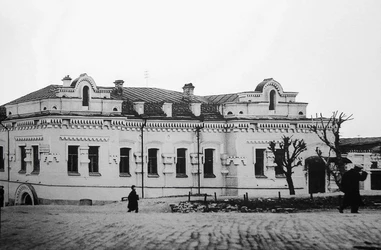
The Ipatiev House, where Nicholas II was executed along with his family
The Bolsheviks, led by Yakov Yurovsky, a rigid black-bearded man who worked in the local Cheka (secret police), acted in cold blood, finishing off those who didn’t die right away with knives and bayonets. That’s what Yurovsky himself wrote in a note, calling himself in third person, “commander,” which indeed was his post in the “House of Special Purpose”:
“The commander told the Romanovs that, as their relatives in Europe keep on attacking Soviet Russia, the Bolshevik government in the Urals gave a verdict to shoot them. Nicholas turned to the family, then turned back to the commander, asking: ‘What? What?’ The commander repeated… then the firing started, which lasted for two or three minutes. It was the commander who killed Nicholas instantly.”
The last sentence, however, might be incorrect, and to this day it is still disputed who exactly among the firing squad shot and killed the ex-emperor. Yurovsky’s testimony, however, shows his ruthlessness and brutality. What turned him into an executioner?
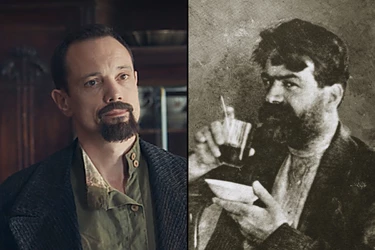
Actual Yakov Yurovsky vs. portrayed by Duncan Pow
In The Last Czars, a 2019 show by Netflix, Yurovsky, portrayed by Duncan Pow, plays a crucial role as an antagonist to Nicholas II. The emperor was (according to the show) a kind but weak man who didn’t want to reign in the first place. Yurovsky, on the contrary, was shown as a devoted person who would do anything for the cause he believed in – making ordinary people’s lives better.
One of the scenes shows Yurovsky speaking to Nicholas days before his execution. The two men are sharing a cigarette and Yurovsky recalls how they met each other once before. “1891, I was 10. You were completing your Far East tour. You stopped in Tomsk… I had a little flag, waving it. Just one of the little ants you were nodding and waving at.”
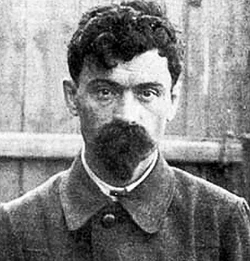
In reality, Yurovsky wouldn’t have bothered to speak with Nicholas II unless it was necessary, let alone share childhood memories. Born into a poor Jewish family in 1878 near Tomsk (3,600 km east of Moscow) – so he certainly wasn’t 10 in 1891 – Yurovsky was eighth among 10 siblings, He often changed his place of residence and occupation early in life, frequently wandering around Russia as a watchmaker’s apprentice.
In 1905, Yurovsky became acquainted with revolutionaries. Knowing quite well the hardships that Russians faced on a daily basis, he turned into an ardent anti-monarchist, spending several years in exile. Then, 12 years later he welcomed the October Revolution of 1917, which gave power to his comrades – the Bolsheviks.
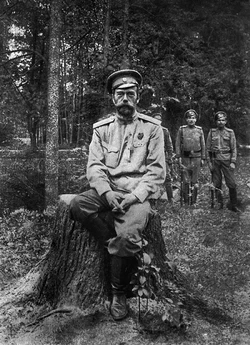
Nicholas II after his abdication
While Vladimir Lenin, Leon Trotsky, and other prominent communist leaders were ruling Soviet Russia from Moscow, Yurovsky was among those working in the Russian hinterland, namely in Yekaterinburg, an important citadel and industrial city in the Urals with a powerful workers’ movement. Loyal to the Communist Party, Yurovsky dutifully performed everything his bosses told him to do.
When he was appointed the commander of the “House of Special Purpose” it meant the Bolsheviks wanted to harden conditions for their royal prisoners.
“They put a steel bar on the only window we had,” ex-empress Alexandra wrote in her diary soon after meeting Yurovsky. “Obviously, they are constantly afraid of us escaping.” On the other hand, Yurovsky, a man of principle, stopped the guards from stealing food from the prisoners, which happened often under his predecessor.
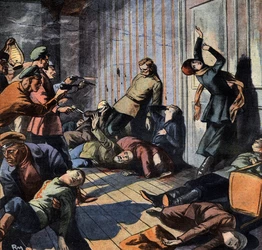
Reconstruction of the massacre of Nicholas II. Frontpage of French newspaper Le Petit Journal Illustre, July 25, 1926
Yurovsky had no sympathy towards his prisoners. Later, in his memoirs, he would write: “My general impression was the following: an ordinary, I would say a bourgeois family… Nicholas himself looked like a petty low-ranking officer… No one would say that the man used to be Czar of such an enormous country for many years.”
Throughout his life, he never showed any signs of guilt for executing the royal family, including the children. His report is laconic: “On July 16, 6 p.m. Filipp Goloshchyokin [Yurovsky’s boss] ordered to execute the prisoners.” By 1 a.m. the next day the Romanovs and their servants were dead.
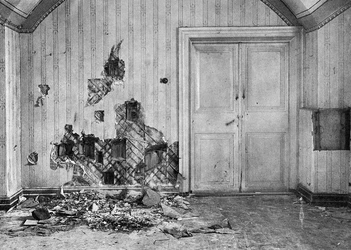
The cellar where the royal family was shot, after the execution
Yurovsky and his men, however, failed completely in terms of disposal of the bodies – their first plan was to throw the bodies in a deep mine outside the city but it turned out not deep enough, so they had to move the bodies to another site. The weather conditions were severe, and cars couldn’t reach the place “Nothing was prepared, no shovels, nothing…” Yurovsky wrote later.
In the end, they partly burned the bodies and buried them in a shallow grave.
There was a reason why the Bolsheviks executed the Romanovs in July 1918 - at that time the anti-Bolshevik White Army was close to Yekaterinburg, and there were concerns that the imperial family would be freed and taken out of the country. Soon after plotting the infamous execution, Yakov Yurovsky, along with many other Bolsheviks, had to flee the city.
However, he returned later when the Bolsheviks finally defeated the Whites in 1922. Later, in Moscow and in Yekaterinburg, he worked at many posts - none connected with executions. Yurovsky died in 1938 of a peptic ulcer.
By Oleg Yegorov

Yakov Yurovsky surely loved tea - In one of few photos we have he is portrayed with a large glass
This devoted Bolshevik commanded executioners to unleash the fury of their guns on the Romanovs, and even after many years passed Yurovsky never regretted what he did.
As you may know, Russia’s last emperor, Nicholas II, was executed on July 17, 1918, when the Bolshevik guards opened fire on him and his entire family: wife, four daughters and a son, as well as five servants.
This grisly event happened in the cellar of the so-called “House of Special Purpose” in Yekaterinburg (a major city in the Urals, 1,700 km east of Moscow), where the former imperial family was held since April 1918.

The Ipatiev House, where Nicholas II was executed along with his family
The Bolsheviks, led by Yakov Yurovsky, a rigid black-bearded man who worked in the local Cheka (secret police), acted in cold blood, finishing off those who didn’t die right away with knives and bayonets. That’s what Yurovsky himself wrote in a note, calling himself in third person, “commander,” which indeed was his post in the “House of Special Purpose”:
“The commander told the Romanovs that, as their relatives in Europe keep on attacking Soviet Russia, the Bolshevik government in the Urals gave a verdict to shoot them. Nicholas turned to the family, then turned back to the commander, asking: ‘What? What?’ The commander repeated… then the firing started, which lasted for two or three minutes. It was the commander who killed Nicholas instantly.”
The last sentence, however, might be incorrect, and to this day it is still disputed who exactly among the firing squad shot and killed the ex-emperor. Yurovsky’s testimony, however, shows his ruthlessness and brutality. What turned him into an executioner?
From a watchmaker to a Bolshevik

Actual Yakov Yurovsky vs. portrayed by Duncan Pow
In The Last Czars, a 2019 show by Netflix, Yurovsky, portrayed by Duncan Pow, plays a crucial role as an antagonist to Nicholas II. The emperor was (according to the show) a kind but weak man who didn’t want to reign in the first place. Yurovsky, on the contrary, was shown as a devoted person who would do anything for the cause he believed in – making ordinary people’s lives better.
One of the scenes shows Yurovsky speaking to Nicholas days before his execution. The two men are sharing a cigarette and Yurovsky recalls how they met each other once before. “1891, I was 10. You were completing your Far East tour. You stopped in Tomsk… I had a little flag, waving it. Just one of the little ants you were nodding and waving at.”

In reality, Yurovsky wouldn’t have bothered to speak with Nicholas II unless it was necessary, let alone share childhood memories. Born into a poor Jewish family in 1878 near Tomsk (3,600 km east of Moscow) – so he certainly wasn’t 10 in 1891 – Yurovsky was eighth among 10 siblings, He often changed his place of residence and occupation early in life, frequently wandering around Russia as a watchmaker’s apprentice.
In 1905, Yurovsky became acquainted with revolutionaries. Knowing quite well the hardships that Russians faced on a daily basis, he turned into an ardent anti-monarchist, spending several years in exile. Then, 12 years later he welcomed the October Revolution of 1917, which gave power to his comrades – the Bolsheviks.
New appointment

Nicholas II after his abdication
While Vladimir Lenin, Leon Trotsky, and other prominent communist leaders were ruling Soviet Russia from Moscow, Yurovsky was among those working in the Russian hinterland, namely in Yekaterinburg, an important citadel and industrial city in the Urals with a powerful workers’ movement. Loyal to the Communist Party, Yurovsky dutifully performed everything his bosses told him to do.
When he was appointed the commander of the “House of Special Purpose” it meant the Bolsheviks wanted to harden conditions for their royal prisoners.
“They put a steel bar on the only window we had,” ex-empress Alexandra wrote in her diary soon after meeting Yurovsky. “Obviously, they are constantly afraid of us escaping.” On the other hand, Yurovsky, a man of principle, stopped the guards from stealing food from the prisoners, which happened often under his predecessor.
Sloppy execution

Reconstruction of the massacre of Nicholas II. Frontpage of French newspaper Le Petit Journal Illustre, July 25, 1926
Yurovsky had no sympathy towards his prisoners. Later, in his memoirs, he would write: “My general impression was the following: an ordinary, I would say a bourgeois family… Nicholas himself looked like a petty low-ranking officer… No one would say that the man used to be Czar of such an enormous country for many years.”
Throughout his life, he never showed any signs of guilt for executing the royal family, including the children. His report is laconic: “On July 16, 6 p.m. Filipp Goloshchyokin [Yurovsky’s boss] ordered to execute the prisoners.” By 1 a.m. the next day the Romanovs and their servants were dead.

The cellar where the royal family was shot, after the execution
Yurovsky and his men, however, failed completely in terms of disposal of the bodies – their first plan was to throw the bodies in a deep mine outside the city but it turned out not deep enough, so they had to move the bodies to another site. The weather conditions were severe, and cars couldn’t reach the place “Nothing was prepared, no shovels, nothing…” Yurovsky wrote later.
In the end, they partly burned the bodies and buried them in a shallow grave.
Later life
There was a reason why the Bolsheviks executed the Romanovs in July 1918 - at that time the anti-Bolshevik White Army was close to Yekaterinburg, and there were concerns that the imperial family would be freed and taken out of the country. Soon after plotting the infamous execution, Yakov Yurovsky, along with many other Bolsheviks, had to flee the city.
However, he returned later when the Bolsheviks finally defeated the Whites in 1922. Later, in Moscow and in Yekaterinburg, he worked at many posts - none connected with executions. Yurovsky died in 1938 of a peptic ulcer.